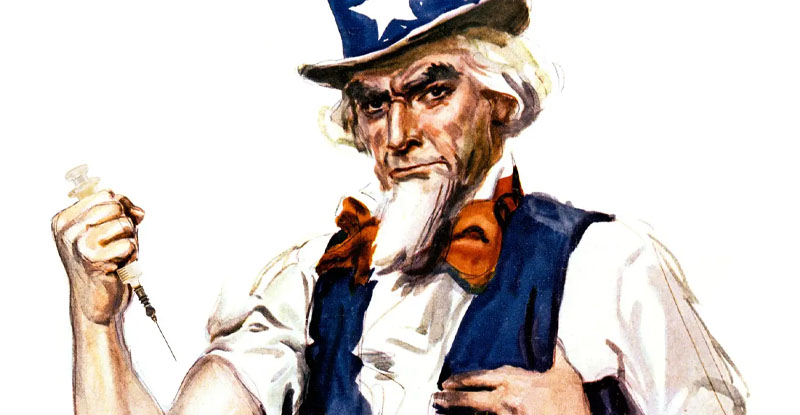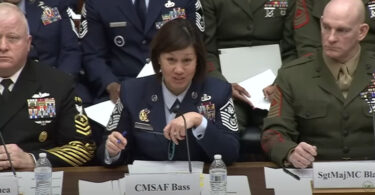Under pressure from Republicans in Congress, the Defense Department announced at the start of this year that it would no longer require American service members to be vaccinated against COVID-19.
The policy change faced fierce resistance from the military’s top brass, including Secretary of Defense Lloyd Austin. In a memo sent in January repealing the requirement for soldiers to be vaccinated, Secretary Austin continued to credit the vaccine with “the many lives we saved … and the high level of readiness we have maintained.”
But critics of the military’s COVID-19 policy, including active and former service members who spoke with Tablet for this article, tell a different story.
They say that the requirement for troops to receive the new vaccines, which included those with natural immunity after recovering from previous COVID-19 infections, was damaging to morale and hurt the military’s combat readiness.
Sen. Ron Johnson, R-Wis., has repeatedly pointed to medical data which suggests that enforcing mass vaccinations on a generally young and healthy population may have actually caused an increase in non-COVID-19 related health problems in the force, though the Defense Department has not provided him or Tablet with a clear interpretation of that data.
By the time the Pentagon announced it was ending the mandate, 96% of service members across the armed forces had been vaccinated.
However, a significant number of troops declined the shots, objecting on religious, scientific, or medical grounds.
Of those objectors, 8,339 were kicked out of the military, a loss that was particularly acute coming in the midst of the worst recruitment crisis in 50 years, which saw the Army, Navy, Coast Guard, and Air Force all struggling to attract or retain members.
The number of ejected objectors might continue to rise, as more service members who declined to get the jab are penalized for “refusing to obey a lawful order.”
Many of those who were forced out, meanwhile, were given a “general” discharge rather than an “honorable” one, putting them at a disadvantage for future employment.
While a 96% compliance rate suggests general cohesion and a functioning military, the lurking reality is that a large percentage of troops who got the vaccine appear to have done so under duress.
Tablet spoke with eight active and former service people for this article who come from some of the Army’s most prestigious units, as well as the Coast Guard.
They paint a picture of a force that is divided and embittered and say that many of their compatriots resented being forced to take the shots against their will or even conscience in order to keep food on the table for their families.
One soldier estimated that as many as 90% of his unit didn’t want to get the shots, and that many who caved now feel they should have held out for the mandate to be repealed.
Another said he only knew three people in his entire platoon that got the shots “of their own volition” prior to the implementation of the mandate.
John Frankman, who declined the shot and left the Army in July 2023 after eight years of active service, including three as a Green Beret, told Tablet, “I’m getting out specifically because of the shot, even though it’s not mandatory anymore. I’ve lost out on enough opportunities, it doesn’t seem worthwhile for me to stay in.”
An Army infantryman from an elite unit who wished to remain anonymous told Tablet that he saw a senior noncommissioned officer from his unit tell a group of vaccine holdouts that they “were the reason America was in decline.”
A paratrooper who spoke with Tablet anonymously said that leadership in his unit began an intense campaign to pressure soldiers to get the COVID-19 vaccines months before the Army officially implemented its mandate on Aug. 24, 2021.
The paratrooper says that he heard a company commander in his unit say that he would “make my soldiers’ lives as miserable as fucking possible until they get the shot.”
For the commanders, meanwhile, who were tasked with enforcing public health positions that turned out to be false, there are now concerns about reputational damage.
“Soldiers know your position. You can say some untruths [and] no one’s going to give you a hard time about that,” said one former company commander. “But when you’re changing the story every week and obviously just saying nonsense because your higher command is telling you that … I saw personally that we were alienating our rank and file in a big way. We were losing their trust, and I didn’t want to be a part of that.”
In many cases, commanders embraced these policies with a commitment that went beyond the zeal for enforcing Army policies that is common among junior officers, according to the paratrooper.
Rather, he calls the push to make soldiers get the COVID-19 vaccine the single most “divisive and destructive” event he witnessed in the military in more than a decade of service. . . . (read the rest on Tablet Magazine)
Also see this as part of the article:
. . . On the whole, the impression given from the lawsuits and multiple accounts provided by members of the military is of a purge that used the vaccine mandate as an excuse to cull the force.
The apparatus through which these force reductions are carried out is the military’s Judge Advocate General’s Corps in its legal branch, known as the JAG Corps.
According to the anonymous ex-JAG officer who spoke with Tablet—and who repeatedly clarified that he’s neither “conservative” nor an “anti-vaxxer”—whenever the DoD wants to reduce force size in a subtle way, they utilize the JAG Corps, the Army’s legal-administrative branch, “and that’s precisely what happened in the context of the vaccine.”
At this point, he added, the lawyers are running the whole show, including combat decisions, and commanders are so scared of them, they just get in line.
“That increasingly hyperliberal JAG Corps now has full sway over the policies of the DoD,” he went on. “So when the DoD wants to vaccinate everyone, the people that are carrying it out are the attorneys.”
The JAG influence over command decisions led this former officer to decide to leave the service even before the vaccine mandates were announced.
Saran agrees with the view that the military’s lawyers have become increasingly powerful.
“They wanted to make use of lawyers and what they got was a politicized military out of it.” And, he says, that top-down, micromanagement legalese approach has created a calloused machine, capable of enforcing orders without any “sense of higher level obligations … It’s really a will-to-power kind of thing.”
This bleak picture of military culture was echoed by nearly every person who spoke to Tablet.
Many of them saw the vaccine push as part of a larger ideological reshaping of the force in which Washington and its administrators in the JAG Corps passed policies disproportionately targeting one group in particular: white, Christian, conservatives.
The flip side of the military’s embrace of DEI ideology, is the targeting of holdouts who are presumed to run afoul of the “inclusion” agenda.
In February 2021, some six months before the vaccine mandate went into effect, Secretary Austin ordered a military-wide “stand down” to address the “challenge of extremism in the ranks.”
The following April, the Pentagon announced a new “Countering Extremism Working Group” to deal with extremism. Describing the anti-extremism training implemented by the Department of Defense, one soldier said, “It’s all about right-wing extremism. And definitely a climate was developing of, ‘If you’re a conservative, you need to watch it.’”. . .








Leave a Comment